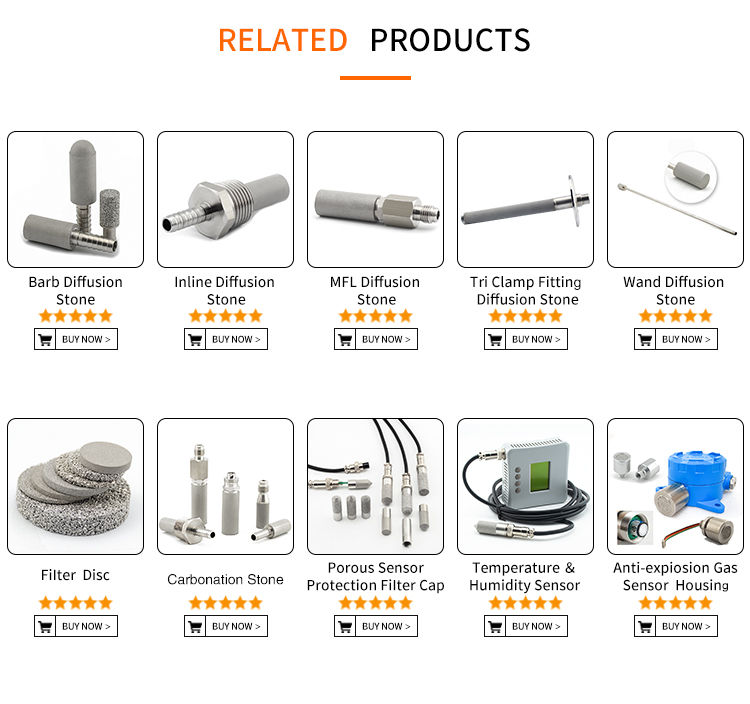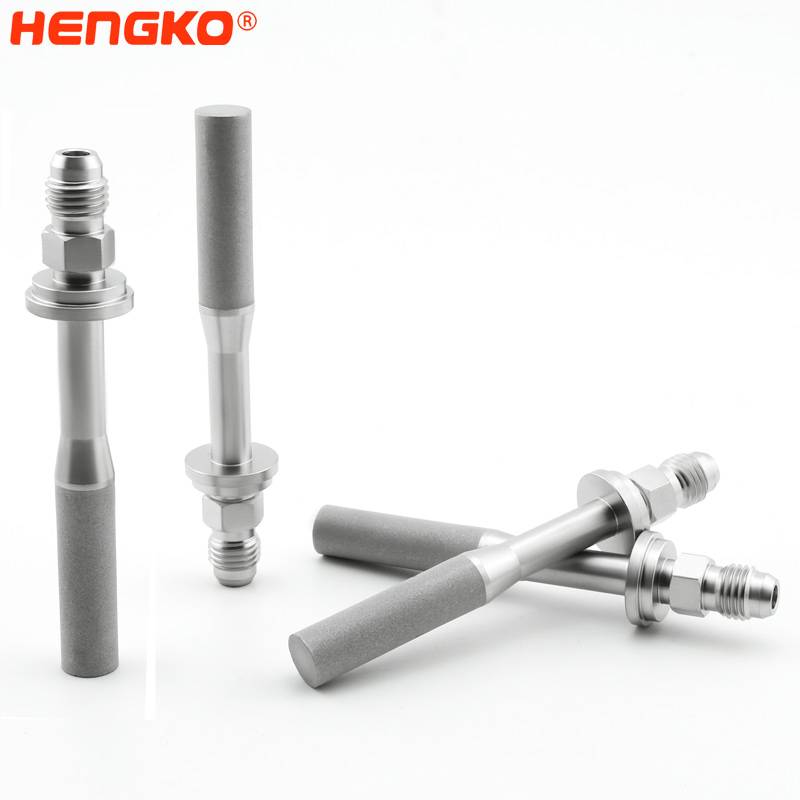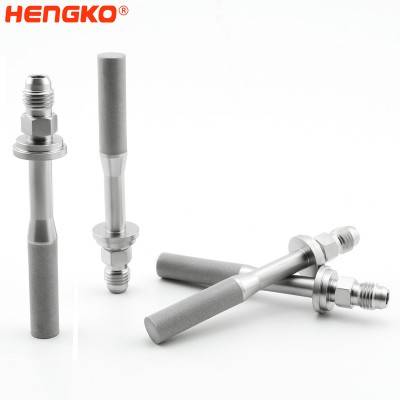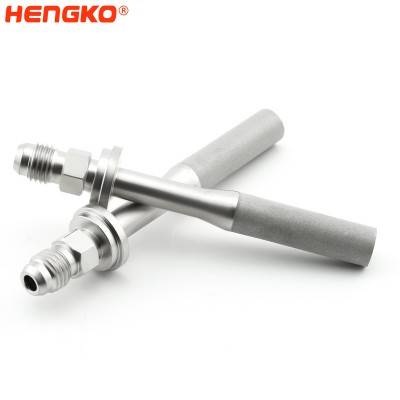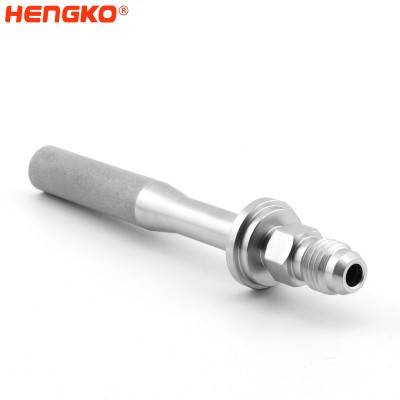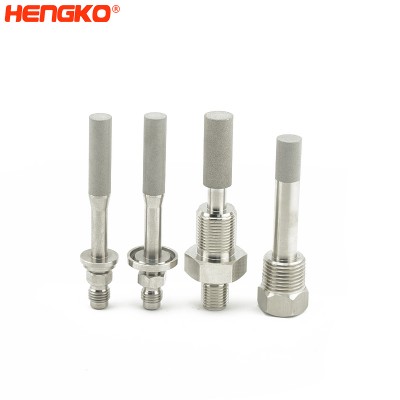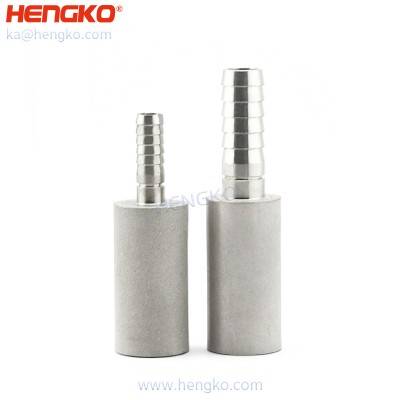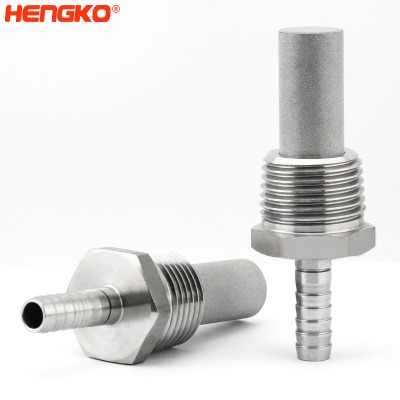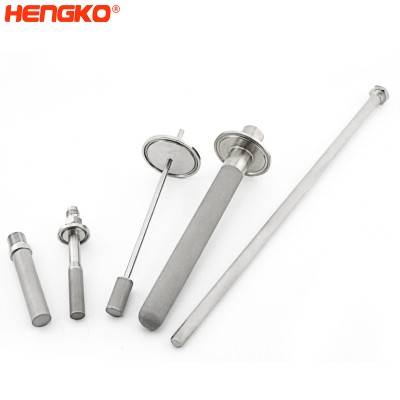micro-algae indoor growing – stainless steel aeration air stone used to control the content of CO2
micro-algae indoor growing – stainless steel aeration air stone used to control the content of CO2,
Aeration Stone, aeration stones plants, aeration wand, air sparger, Air Stone Diffuser, air stones hydroponics, Carb Stone, Carbonation Keg Lid, Carbonation Stone, Carbonation Stones, Corny Keg Carbonation, diffusion stone, Oxygen Stone Brewing, Oxygenation Wand, Porous Sparger, sintered sparger, stainless steel air stone,
| Product Name | Specification |
| SFC01 | D7/17''*H3-7/8'' .5um with 1/4'' MFL |
HENGKO carbonation stone is made of the food grade best stainless steel material 316L, healthier, practical, durable, high temperature resistant and anti-corrosion. It’s easy to clean, and won't crumble in beer or wort after uses.
The 2 micron stone is typically used for oxygenation applications, the 0.5-micron stone for carbonation applications.
The CO2 diffuses through the stone, emerging on the exterior in very small bubbles. Under pressure, the small bubbles of CO2 dissolve into the beer before they can reach the surface. Carbonation stones may also be used in-line. A carbonation stone can be used to carbonate flat beer, to add CO2 to beer with inadequate carbonation for packaging or service, or to scrub dissolved oxygen from beer or water.
SFC01 MFL 0.5 sintered porous stainless steel micro bubble nano Carbonation oxygen generator Aeration Diffusion Stone
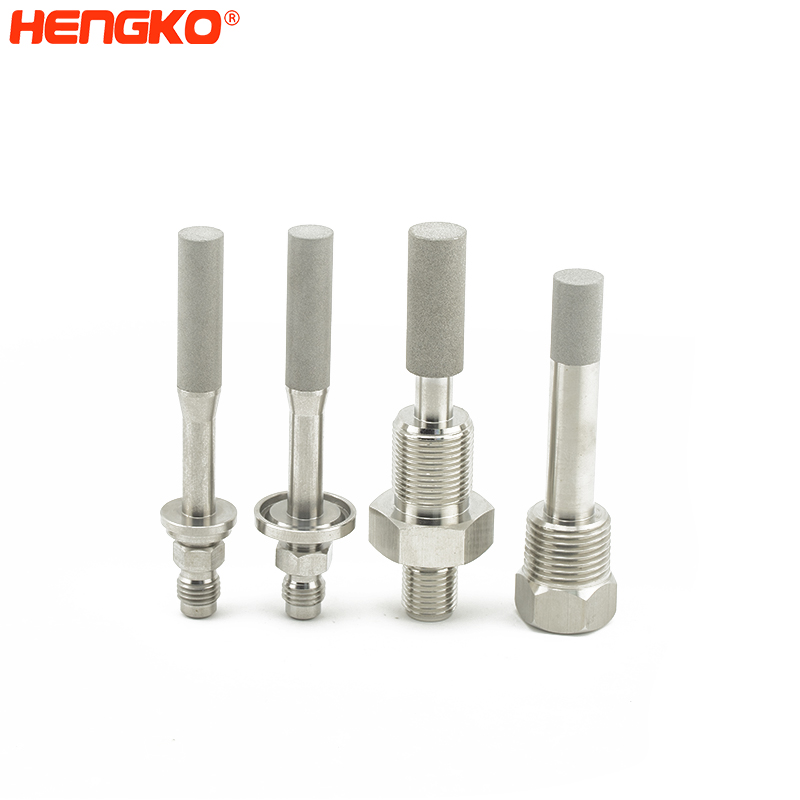
Application:
◆ HENGKO diffusion stone is suitable for force carbonation of beer, it is ideal to force carbonate the kegged beer, or as an aeration stone prior to fermentation. Carbonate the beer just like the pros with this stainless steel carbonating stone.
0.5 HENGKO oxygen stone is used to force carbonate beverages like beer, champagne or sparking meads with carbon dioxide. compared with the 2.0 micron stone, the 0.5 micron stone will carbonate beer quicker and with a longer lasting head because the bubbles that it creates are smaller.
It quickly carbonating beer / soda water, the CO2 or O2 will be forced through the millions of tiny pores in the stone, which dissolves the gas into the liquid. Let your beer or soda water get a good mouthfeel.
Some people like to speed up the process of force carbonating beer by putting extra high pressure on the keg, but a more effective and precise practice is to use a HENGKO carbonation stone or diffusion stone.
Rocking your keg with the low pressure gauge set at 30 PSI may get the beer carbonated in one day. This may also, however, cause you to end up with over carbonated beer, which can be a hassle. It can take longer to get the carbonation out of solution than it look to force it in.
A better solution for speeding up carbonation would be to use a HENGKO carbonating stone, also known as a HENGKO diffusion stone. This is a piece of stainless steel, perforated throughout with a huge number 0.5 – 2 micron holes. Keg lids fitted with a diffusion stone are also available.
Force carbonating beverages.
Set your regulator to about 2 psi, and the gas will be forced through the millions of tiny pores in the stone, which dissolves the gas into the liquid. Your beer will be carbonated overnight.
You will need a homebrew kegging outfit with CO2 tank, regulator, lines, and a keg. Simply attach a 24" length of ¼” ID tubing to the gas side dip tube of your keg with a worm clamp. On the other end of the tubing, attach the diffusion stone using another clamp. There are charts available online and in books for exact levels of temperature and CO2 pressure to achieve desired carbonation levels. Following is an example for average carbonation in beer: Chill the beer to 40 F. Adjust the regulator to 2 PSI and attach the gas disconnect. Every 3 minutes increase the pressure 2 PSI until 12 PSI is reached. At this point the beer will be carbonated, but it won’t hurt to leave it alone in the refrigerator for a few days under pressure.
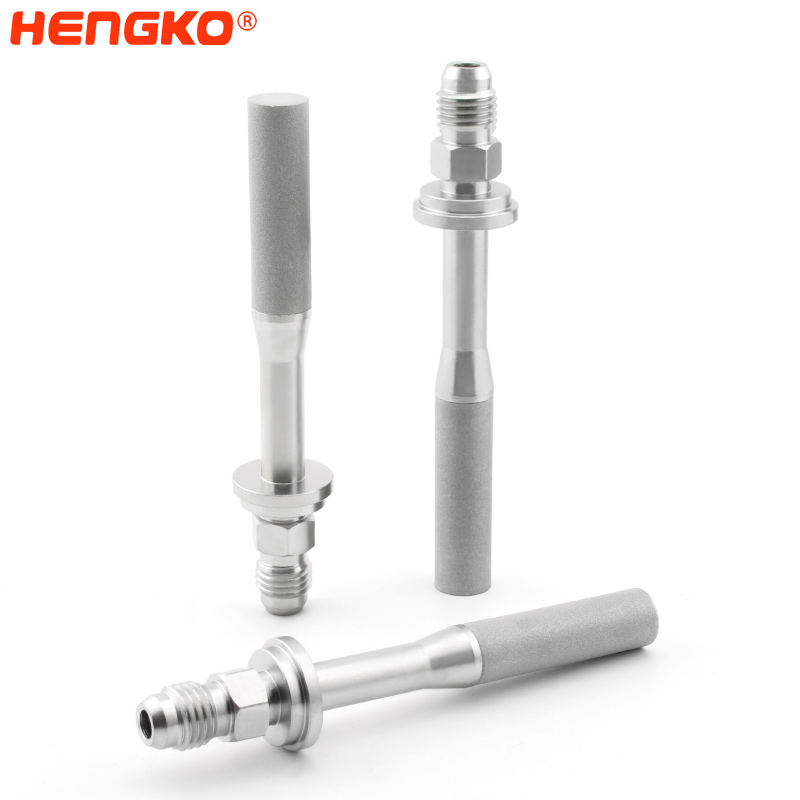
How to use the diffusion stone
1.The “stone” sits inside the keg near the bottom.
2.A hose barb attaches it to a length of tubing (generally about 2 feet of 1/4” ID thick wall vinyl hose) which is affixed to the short downtube under the “in” or “gas side” post.
3.When the CO2 is connected, it sends a tremendous number of gas bubbles out through the beer. The miniscule bubbles create a huge amount of surface area to help absorb CO2 rapidly into the beer. This is actually a miniature version of a device used by commercial breweries everywhere.
4.Carbonation should be virtually instantaneous, though the manufacturer recommends carbonating your beer at least a few hours before serving.
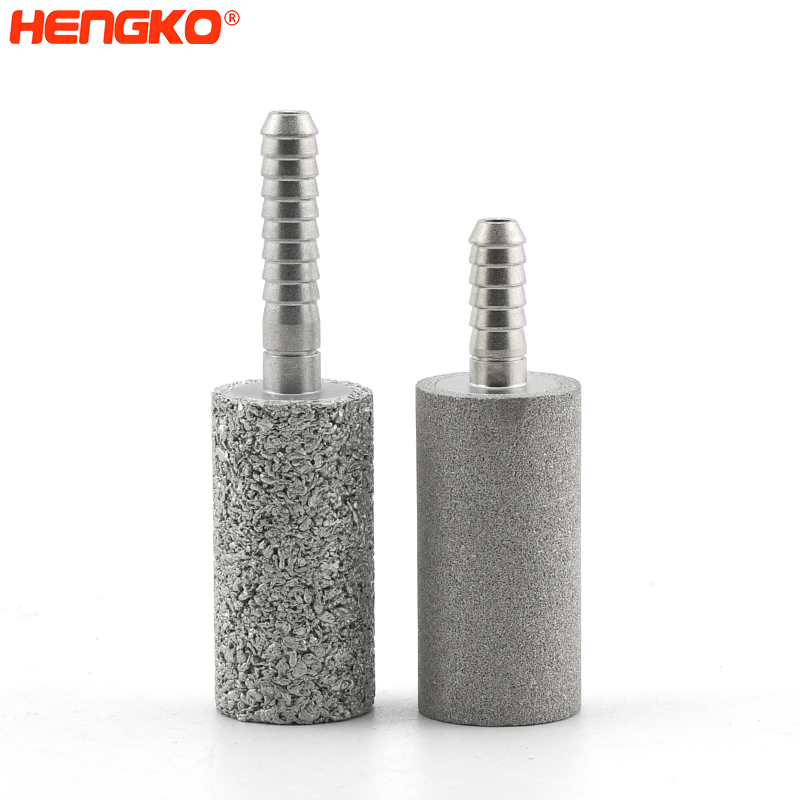
HEGNKO diffusion stone can be installed into the 1/2″ FPT fitting or 1/4″ diameter ,1/4" barb or other custom connector, to connect with compressed oxygen tanks , air pumps or kettle&wort chiller by hose.
The detail attention :
After carbonation, you can shake the beer keg. If do that, you beer can reach the best mouth-feel.high gravity beers may require more time because oxygen does not dissolve as easily in liquids with a high specific gravity.
It's important to clean and sanitize diffusion stones thoroughly before each use and after use. Install an air filter, ensure a clean air source or the air being fed into the stone is clean, to prevent contaminants from clogging the stone or infecting the wort.
To properly sanitize your stones, we recommend you run it in a sanitized solution for 5 minutes. If the stone becomes clogged we recommend boiling the stone for 1-3 minutes to sanitize & unclog the pores , help break down anything within it. If boiling is not an option, we recommend soaking in Star San. Star San will remove a majority of surface contamination/bacteria, but will not sanitize the interior of the stone which may or may not be contaminated. If the pores in aeration stone get blocked from handling give a 15 seconds dip in hydrochloric acid before rinsing with water.
Use sanitized gloves, don’t touch the porous surface body of diffusion stone by hands, the oils on fingers can clog the small pores in the stone.
Product Show ↓

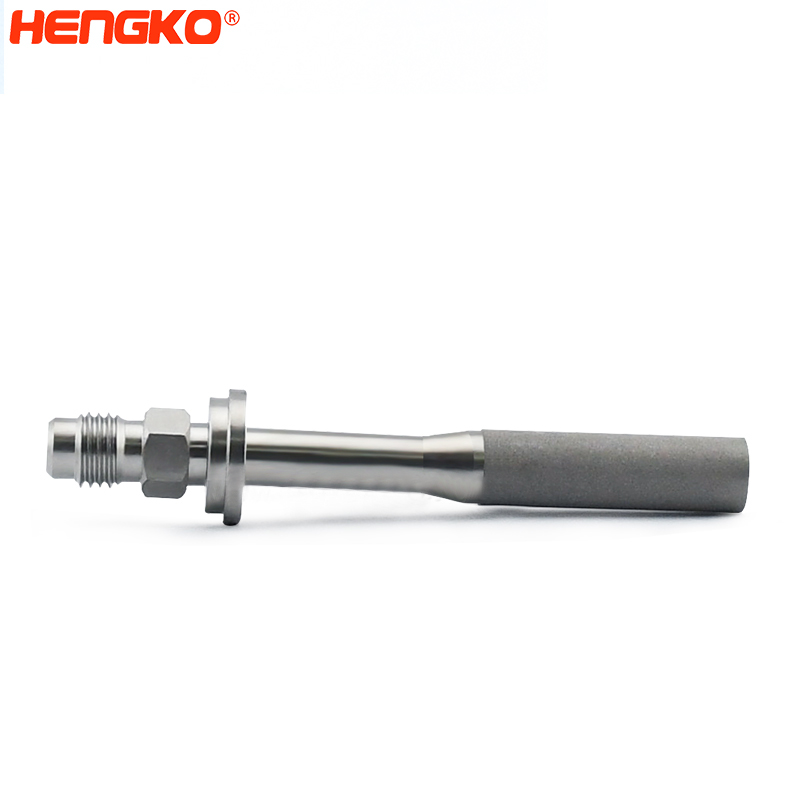
The advantages of HENGKO stone:
* NO BLOCKING —— Millions of tiny pores make it can carbonation beer and soda prior to fermentation quickly,the micron stone is ideal to force carbonate your kegged beer or as an aeration stone prior to fermentation. Not easy to get clogged as long as it's ungreasy.
* EASY TO USE —— Just connect your oxygen regulator or aeration pump to the stainless steel diffusion stone and aerate your wort as beer flows through the line. Connects inline with any kettle, pump, or counterflow/plate wort chiller.
* Easy To Sanitize —— soaking this 0.5 micron diffusion stone in boiling water for 20 to 30 seconds. Don't touch the actual carbonated portion of the stone with your hands
* Easy To Install Or Use —— Using 1/4" ID tubing to connect to the hose barb on the stone.This carbonation stone can used with the air pumps,no more need shaking your bottle
* 100% Satisfaction —— We aim to provide the highest quality service and the best product quality for each customer. Place your order without any worry. If you have any question, please feel free contact us. We will unconditionally solve for you!
